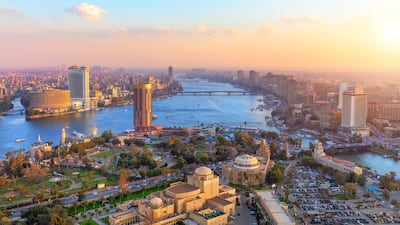Abu Dhabi's holding company ADQ bought stakes in publicly-listed Egyptian companies across key sectors, from FinTech to logistics, to help bolster the country's economy and capitalise on the investment potential of the most populous Arab country.
The deals include investments in shares of Commercial International Bank, digital payments platform Fawry, logistics player Alexandria Container and Cargo Handling Company, Misr Fertilisers Production Company and Abu Qir Fertilisers and Chemical Industries, ADQ said in a statement on Wednesday.
It did not disclose the size of investments or the stakes it has acquired in publicly-traded companies.
The move is part of ADQ's $20 billion joint strategic investment platform with The Sovereign Fund of Egypt that was launched in 2019, it said.
“The recent transactions are a testament to our long-term commitment to elevate our investment partnership with Egypt and to continue deploying capital in projects of commercial importance,” Mohamed Al Suwaidi, managing director and chief executive of ADQ, said.
Egypt, the Arab world's third largest economy is forecast to expand 5.6 per cent in 2022, and was one of the few emerging market countries that recorded positive economic growth during the Covid-19 pandemic, according to the International Monetary Fund.
In December, ADQ opened a new office in Cairo as it seeks to increase its investment there.
Egypt's large domestic market, strong local demand, productivity growth, “enormous” untapped export potential and positive trade outlook were key drivers behind the investments, ADQ said.
This month, Egypt’s Gulf allies pledged up to $22bn to help the country cope with the effects of the war in Ukraine.
Egypt is also seeking the support of the International Monetary Fund to minimise the impact of the Russia-Ukraine crisis on its economy.
The new investment in Egyptian listed companies is the latest in ADQ's string of forays into Egypt.
Last year, ADQ and Aldar Properties, the biggest developer in Abu Dhabi, acquired a majority stake in Egypt’s Sixth of October for Development and Investment Company for $386.8 million.
In April 2021, the Abu Dhabi company acquired Egypt’s Amoun Pharmaceutical Company from Canada's Bausch Health for $470m, in a move that strengthens ADQ's long-term healthcare and pharmaceutical portfolio. Amoun operates one of the largest drug plants in Egypt.
Many of ADQ's portfolio companies have also invested in Egypt. AD Ports Group, in which the state holding company has a stake, signed an agreement with the Egyptian Group for Multipurpose Terminals, the commercial arm of the Egyptian Ministry of Transportation, to develop and operate a multipurpose terminal in Safaga Port on the Red Sea.
“The UAE and Egypt share a deep relationship underpinned by strong economic and trade ties,” Mr Al Suwaidi said.
Since the launch of ADQ’s strategic investment platform with the Egyptian sovereign fund, "we have executed several investment opportunities in Egypt, with the aim to deliver robust commercial benefits and sustainable growth”, he added.
Established in 2018, ADQ is one of the region's largest holding companies with direct and indirect investments in more than 90 companies locally and internationally. It has been expanding its global footprint to accelerate Abu Dhabi’s transformation into a globally competitive and knowledge-based economy.


